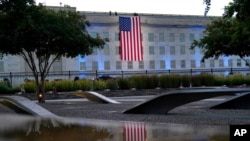September 11, 2001, seems like yesterday for the small group that gathered Friday at the Pentagon Courtyard to mark the 22nd annual memorial for those who perished in the attack.
The event began with a solemn performance by the United States Army Brass Quintet. Audience members fanned themselves with event guides in the sweltering Virginia heat, most clustering beneath nearby trees for relief.
Those in attendance knew the 184 people who were killed at the Pentagon more than two decades ago. Some were close friends, family members, or co-workers — all lost to an act of terrorism that would change the course of American history.
On the 2001 morning, 19 al-Qaida terrorists hijacked four commercial airplanes, turning them into precision missiles. The first plane crashed into the North Tower of the World Trade Center in New York City. Sixteen minutes later, the second plane hit the South Tower. Manhattanites abandoned their cars and watched as disaster unfolded 110 stories above.
A third plane smashed into the Pentagon, headquarters of the Department of Defense in Arlington, Virginia. The last plane likely was destined for the Capitol but instead crashed in Shanksville, Pennsylvania, after passengers tried unsuccessfully to wrest control of the cockpit. Nearly 3,000 people from 93 countries lost their lives that day, the worst attack on American soil since Japan's assault on Pearl Harbor in 1941.
The Pentagon was ultimately restored, and a new World Trade Center rose.
But the attack's scars, both literal and figurative, remain. Chaplain John Goodloe of the Armed Forces Retirement Home in Washington gave the invocation.
"Our land needs healing, O God," he prayed, stressing the importance of diversity and interfaith tolerance.
After remarks from Deputy Defense Director Sajeel Ahmed and Admiral Christopher Grady, Deputy Defense Secretary Kathleen Hicks delivered the keynote address.
"As someone who remembers vividly the course of my own steps right here at the Pentagon that day," she said, "I can tell you: sharing these personal reflections remains hard."
Hicks highlighted her colleagues' heroism, echoing Ahmed's remarks. All of the speakers shared a common message: resilience.
Hicks and Ahmed noted that the Pentagon's doors reopened a day after the fires were extinguished. The collapsed corner of the building where the plane hit was cordoned off and business resumed. Then-Secretary of Defense Donald Rumsfeld, Ahmed said, returned undaunted to where calamity had struck.
Hicks called on adults to continue an intergenerational dialogue. Young Americans, she said, must be taught to appreciate how the events of September 11 have changed the world around them, even if "[t]hey were too young [to remember] or hadn't yet been born."
"You are not alone," she told an audience of surviving family members, first responders, and co-workers who were spared. "We have not forgotten about you or those we've lost. And we never will. Thank you."
After a moment of silence, a trumpeter played taps. The chaplain returned to the stage and his final prayer.
On Monday, there will be a private observance at the Pentagon Memorial for the loved ones of those who died in 2001. Friday's ceremony was for the public.
President Joe Biden plans to pay his respects, though, at Joint Base Elmendorf-Richardson in Anchorage, Alaska, a pitstop on his journey back from India's G20 summit and a diplomatic meeting in Hanoi.




